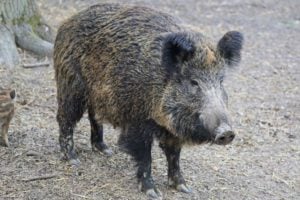
Wild swine on the loose in Michigan create huge problems for landowners and natural species alike. These feral pigs uproot crops, create mudholes, dig large trenches and holes, contaminate water sources and raiding nesting grounds for local bird species like turkeys and pheasants. Even worse, these wild pigs spread serious diseases such as salmonellosis, tuberculosis, hepatitis and e.coli to other livestock and even humans. One of the biggest dangers is that these feral swine spread virus pseudorabies to domestic hogs and can devastate entire farm operations. Wild pigs have been seen in 70 of Michigan’s 83 counties.
These invasive pig species include the Old World swine, razorback, Eurasian wild boar and Russian wild boar. They are distinguished from domestic pig species with their protruding straight snout, erect ears, brown or black fur, and straight tails.
The mess that wild swine can create has led to the Michigan Legislature declaring feral pigs running at large on public or private property to be a public nuisance. MCL 433.14a(1). Local animal control officers or law enforcement officers may kill swine running at large on public or private property. MCL 433.14a(2). However, this alone has not been enough to stem the rise of the wild pig population and the spread of the damage they cause. As a result, the Michigan Legislature has also empowered private citizens to contribute to the solution by allowing them to also kill wild swine under a “shoot-on-sight” law once certain conditions are met.
Pursuant to MCL 433.14a(3), individuals not affiliated with the government may kill feral pigs as follows:
- A person may kill swine running at large on private property if the person is, or is accompanied by or has the permission of, the owner or lessee of the property.
- A person may kill swine running at large on public property if he or she possesses either of the following:
-
- A license to carry a concealed pistol issued under MCL 28.421 to MCL 28.435.
- A valid hunting license for any game issued under the Natural Resources and Environmental Protection Act, MCL 324.43501 to MCL 324.43561.
- This empowerment does not authorize the discharge of a bow and arrow, crossbow or firearm in an area where the discharge of that weapon or hunting of that weapon is prohibited by a local ordinance. MCL 433.14a(4).
With a valid hunting license, if you are legally hunting game during an open season of any kind and you follow all of the regulations of the open season which you are hunting, then you may also pursue and kill any feral swine. Since some species can be hunted all year round, there is technically no season that killing wild swine is limited to. However, you still limited to shooting wild swine during regular day or night hunting hours as determined by regulations promulgated by the Michigan Department of Natural Resources.
However, please note that you do not need a hunting license if you already have a concealed pistol license for the purposes of shooting wild swine but hunting regulations must still be observed.
If wild swine is killed in violation of the time and place hunting regulations of the Michigan Department of Natural Resources, the offender is guilty of a misdemeanor punishable by a fine between $50.00 and $500.00, or up to 90 days in jail, or both. MCL 324.40118(1). In addition, the hunting permit issued for that season will also be revoked.
If wild swine is killed in an area where discharge of a bow and arrow, crossbow or firearm is prohibited by a local ordinance, the offender is guilty of a misdemeanor punishable by a fine up to $500.00 or up to 90 days in jail, or both. MCL 324.41905.
Any person who kills wild swine under this “shoot-on-sight” law should report the incident to local law enforcement. The Michigan Department of Natural Resources and the U.S. Department of Agriculture may want to collect blood or tissue samples from the carcass to test for diseases or determine migration patterns for the species.
If you have questions about wild swine laws or need legal representation, then do not hesitate to contact the experienced attorneys at Kershaw, Vititoe & Jedinak PLC for assistance today.





